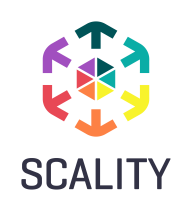


Scality RING and Dell PowerScale compete in the storage solutions category, focusing on scalability and data management. Dell PowerScale holds an advantage due to its advanced data management features and long-term cost-effectiveness.
Features: Scality RING offers unified file and object storage, high scalability, and flexibility for handling unstructured data. Dell PowerScale provides intelligent data tiering, in-depth analytics, and enhanced data management, offering significant insights and storage efficiency.
Room for Improvement: Scality RING could benefit from enhanced analytics capabilities, expanded data tiering options, and more comprehensive integration with other platforms. Dell PowerScale may improve by simplifying deployment processes, increasing cost-effectiveness for smaller enterprises, and expanding support for hybrid cloud environments.
Ease of Deployment and Customer Service: Scality RING is known for its simple deployment and robust support services, appealing to companies seeking easy onboarding. Dell PowerScale's deployment is complex due to its comprehensive features but is supported by extensive customer service ensuring necessary assistance.
Pricing and ROI: Scality RING offers competitive pricing with a flexible cost structure, providing quick ROI for SMEs. Dell PowerScale, with higher initial costs, offers long-term returns supported by its robust features and cost efficiencies, proving beneficial for larger enterprises needing extensive data solutions.
It does not require much management once you set up correctly, so it saves time, allowing an admin to focus on other work.
Despite being more expensive than Huawei, it is stable and most enterprises accept the price due to its stability.
In terms of Dell PowerScale (Isilon) specifically, we have seen a return on investment due to faster performance than our last few storage arrays, and the general usability is a lot better.
The second cluster of Dell PowerScale (Isilon) gives us flexibility for small things like code upgrades, all the way to scenarios where we have lost this data center or data, allowing us to check if data is still intact on the other side.
I think RING's ability to maintain predictable costs while providing scalable storage solutions impacts our budget by allowing us to pay only for capacity.
For instance, while the cost per gig on a block storage platform may be $2, it's $1.50 for NAS, and only $0.50 for object storage, leading to a remarkable 75% reduction in costs by utilizing the Scality platform.
Scality RING has reduced our operating costs.
I would rate them an eight out of ten.
The support is done through email and is not that great, making it a very problematic area I've been dealing with for over four years.
Their technical support has been perfect lately, so I would give it a 10.
Support online is definitely a ten out of ten.
Dell provides support within four hours, and they always fulfill their promises.
They have managed previous issues well.
I've always received responses within the required timeframe, the answers were technically relevant, and there was follow-up—people called us back to check if everything was okay and if the ticket could be closed.
Individuals such as Peter Mikolastik really make a difference by saying, 'Come on, what is the problem? I will help you,' rather than just brushing things off.
Technically, when we have major issues in P1, they are very responsive and we can't say that we don't get a response.
Pure Storage FlashBlade is scalable.
There are between 5 and 10,000 people using it in our organization.
We started on PowerScale with around about 300 terabytes and are now two and a half petabytes, still on the same file system.
That's really saved us in certain areas as we didn't have funding to expand Dell PowerScale (Isilon) until next year, which is why we utilized the cloud pools functionality to offload.
Dell PowerScale is highly scalable, as evidenced by the reduced physical hardware and the efficient use of rack space.
Upwards, I think, almost unlimited by what we can imagine.
I've never had issues with scalability.
We are relatively well informed about their new features, what will be implemented in future versions, and the scalability of the solution.
In case there is any issue with any blade, the data is moved to another.
Since we have good protection levels, the data is secured and replicated across the disks.
I assess the stability and reliability of Dell PowerScale (Isilon) as perfect.
I find the product to be resilient and stable. There's no downtime and no crashes.
It is a platform that is very stable at the customer level and does not generate incidents or blockages that you might encounter with standard storage solutions, where you can lose data.
I find that Scality RING is very stable because it allows for many maintenance operations without service loss.
There are factors that can cause Scality RING to become occasionally unavailable, but due to the system's resilience, it is capable of recovering or degrading gracefully.
Technical support definitely needs significant improvement.
Its configuration should be easier.
One way Pure Storage FlashBlade can be improved is by having more compatibility between the FlashArray and FlashBlade.
Hardware failures under warranty should be addressed within the promised timeline.
I would want to see more AI features with Dell PowerScale (Isilon).
If I could improve one thing on Dell PowerScale (Isilon), it would be better object storage as it recently breached into S3, and that capability could be broadened.
Encryption and data security need improvement. We don't have a solution for customers who need confidentiality.
They should prioritize quality over timeliness to minimize customer disruptions and not force customers into a cycle of fixes that interfere with daily work.
What we are currently missing and will be demanding in the new tender is an additional external backup of all data, ideally on a simple system, to safeguard against any severe local incidents so that we still have the data protected elsewhere.
The pricing of Pure Storage FlashBlade is expensive compared to other products I used from other companies in the past, but one benefit is that they have built-in ransomware protection.
Regarding pricing, it is okay; we needed exactly this in size, and the price was a lot lower than competitors, making it good for us.
It's quite expensive for the amount of storage we have.
My experience with pricing, setup costs, and licensing for Dell PowerScale (Isilon) shows it's a premium platform, so it's a big amount of money.
The pricing is excellent.
Fortunately, in terms of the license, we are able to expand the disks without having to adjust the license.
In the end, it always depends on how much you pay for it.
Regarding setup costs and licensing, our initial experience is somewhat dated now as we made a comprehensive purchase, including hardware, software, and system setup, which Scality handled at the time.
We can plug in many blades, and we can have data up to one terabyte.
The best features of Pure Storage FlashBlade include better throughput and better performance.
Pure Storage FlashBlade's scalability is one of the most valuable features, and importantly, it always works, allowing for seamless upgrades.
Dell PowerScale offers high scalability and stability as well, making it a valuable solution for enterprises.
In our AI initiatives, Dell PowerScale (Isilon) plays a significant role in data analysis, data fusion; principally, it is involved in data analysis, data extraction, and statistical analysis.
Single files are limited to four terabytes in our configuration, however, the system can support up to 16 terabytes, so we can scale based on that too.
When a server is lost, the data is still accessible.
It is even better stored when there is only one copy on a system and there is a second copy on an immutability system, which is almost equivalent to backing it up on tape and taking it offline, making it completely inaccessible.
Scality RING has influenced our approach to scaling in different dimensions by providing a cost-effective solution for the tremendous amount of data we generate every day for each customer.
| Product | Market Share (%) |
|---|---|
| Dell PowerScale (Isilon) | 8.2% |
| Scality RING | 4.2% |
| Pure Storage FlashBlade | 5.6% |
| Other | 82.0% |



| Company Size | Count |
|---|---|
| Small Business | 11 |
| Midsize Enterprise | 11 |
| Large Enterprise | 21 |
| Company Size | Count |
|---|---|
| Small Business | 16 |
| Midsize Enterprise | 17 |
| Large Enterprise | 36 |
| Company Size | Count |
|---|---|
| Small Business | 3 |
| Midsize Enterprise | 1 |
| Large Enterprise | 12 |
FlashBlade is the industry’s most advanced scale-out storage for unstructured data, powered by a modern, massively parallel architecture to consolidate complex data silos (like backup appliances and data lakes) and accelerate tomorrow’s discoveries and insights.
Dell PowerScale leads in unstructured data management with unified file and object storage, massive scalability, security, and cloud adaptability, enhancing AI, analytics, and enterprise applications with exceptional performance and resilience.
Dell PowerScale Isilon provides a comprehensive platform for unstructured data, excelling in scalability, management, and performance. With features like single-pane management, SyncIQ, and SmartQuotas, it handles large datasets with flexibility and robust security. Its multi-protocol support and seamless expansion improve operational efficiency. While it offers strong data protection, enhancements in cloud integration, cybersecurity, and performance are sought. Users note potential for cost reductions and streamlined configurations and mention desired improvements in object storage handling and NFS support.
What are the key features of Dell PowerScale Isilon?Organizations across industries utilize Dell PowerScale Isilon for large-scale unstructured storage, supporting applications like video archiving, genomic data storage, and high-resolution imaging. Educational institutions, research centers, and media enterprises rely on its scaled-out storage capabilities, providing centralized, secure storage for diverse applications in hybrid, cloud, and on-prem environments.
Scality RING is the scalable and resilient object storage solution designed for modern workloads, providing seamless data protection against evolving cyber threats.
Scality RING leverages S3 object storage to meet unpredictable demands with a patented MultiScale Architecture that offers limitless scalability across capacity, performance, and more. It delivers end-to-end cyber resilience with CORE5 for ransomware protection, while its cloud-style economics and intuitive management empower enterprises to accelerate AI initiatives and optimize cloud deployments. Its flexibility is ideal for service providers managing extensive data needs.
What are the key features of Scality RING?Scality RING is extensively implemented in backup solutions across industries, supporting platforms like Veeam and CommVault. It aids in storage expansion and management of large data volumes alongside multi-site architectures. While not leading in AI spaces due to performance constraints, there's potential with faster disk support. It's also used in archives, binary lakes, multimedia services, and AI data lakes.
We monitor all File and Object Storage reviews to prevent fraudulent reviews and keep review quality high. We do not post reviews by company employees or direct competitors. We validate each review for authenticity via cross-reference with LinkedIn, and personal follow-up with the reviewer when necessary.